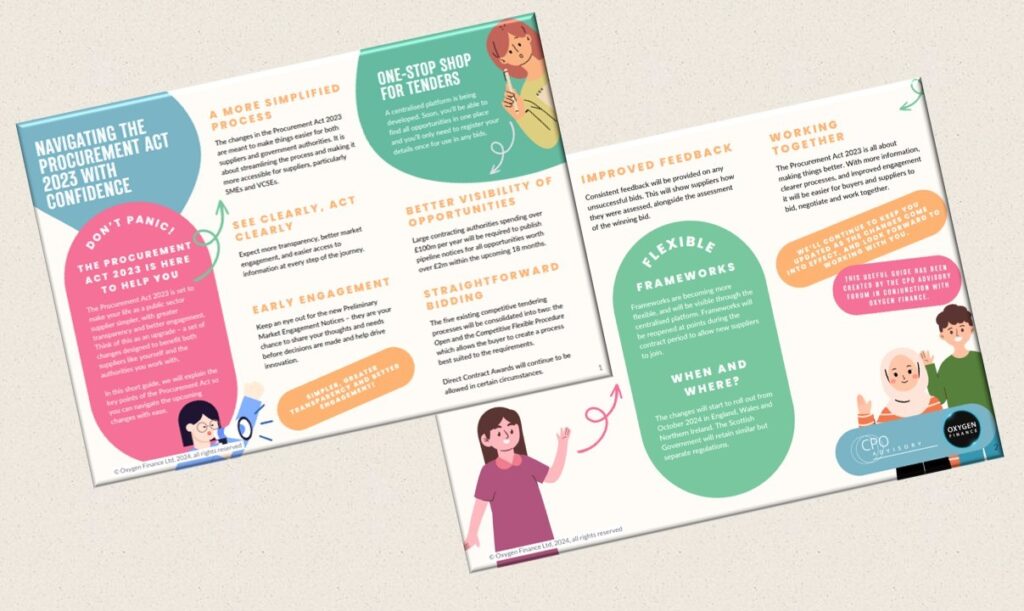Public procurement processes are designed to ensure the efficient allocation of resources and the delivery of essential services. However, guaranteeing fairness, transparency, and compliance with regulations within these processes can be challenging.
The Public Procurement Review Service (PPRS) is an essential entity within the UK government, operating under the Cabinet Office. Established in February 2011, the PPRS serves as a platform for both current and potential suppliers to raise concerns regarding potentially questionable practices in public sector procurement, all while maintaining confidentiality for those who wish to raise issues anonymously.
But what kind of issues can suppliers expect assistance with? What are the criteria for a case to be accepted for investigation? What are the risks? And what can we learn from the adjudications?
Oxygen’s James Himsworth, formerly the Procurement Lead at Middlesbrough Council, delves into the key findings and recommendations from the PPRS’s own reporting, offering valuable insights for both buyers and suppliers.
Let’s break it down.
Why does the PPRS exist?
The primary goal of the PPRS is to enhance the commercial capabilities of contracting authorities by encouraging the adoption of good procurement policies and practices. In addition, by ensuring that public procurements do not unfairly hinder small businesses from bidding for contracts, the PPRS plays a vital role in promoting a fair and competitive marketplace.
One of the key aspects of the PPRS is its ability to investigate and resolve specific cases that meet certain criteria. These include issues related to procurement processes, supply chain concerns, and late payments of invoices within the public sector contracting framework. By focusing on improving procurement practices, promoting best practices, and supporting suppliers in obtaining overdue payments, the PPRS aims to foster transparency, fairness, and efficiency in public procurement processes.
How does the PPRS benefit public sector suppliers?
For suppliers of public services, the PPRS offers a channel to voice concerns and seek resolutions in cases of potential misconduct or unfair practices. By enabling suppliers to raise issues anonymously and providing a platform for dialogue with contracting authorities, the PPRS empowers suppliers to advocate for transparency and accountability in the procurement process. Moreover, by assisting suppliers in obtaining payments for their services, the PPRS plays a crucial role in protecting the interests of businesses, especially small enterprises, operating in the public sector marketplace.
How does the PPRS benefit public sector buyers?
On the other hand, for buyers of public services, the existence of the PPRS signifies a commitment to accountability and integrity in the procurement process. It provides assurance that concerns raised by suppliers are taken seriously and investigated thoroughly to ensure compliance with regulations and ethical standards. By addressing issues promptly and making recommendations for improvement, the PPRS contributes to enhancing the quality and fairness of public procurement practices.
When might a supplier turn to the PPRS?
A supplier might consider reaching out to the Public Procurement Review Service (PPRS) when they have concerns about potentially poor public sector procurement practices and wish to raise these issues anonymously. Here are some of the common reasons that might prompt a supplier to approach the PPRS:
- If the supplier has concerns about the conduct of a specific procurement process they have been part of, or wish to participate in, within the last 2 years.
- If there is an issue related to a procurement process or a supply chain issue that has not been resolved and may conflict with best practice or the Public Contracts Regulations 2015.
- In the case of late payments for valid and undisputed invoices related to in-scope public contracts (not paid within 30 calendar days or any earlier payment date as stated in the contract terms).
- If the concern involves potential conflicts with best practices or regulations at any stage of the procurement process, such as pre-procurement activities, advertising of contracts, formal tendering processes, or contract management.
- If the issue pertains to a specific public sector entity, such as central government departments, executive agencies, non-departmental public bodies, or local authorities and fire and police services, excluding certain exempt bodies.
What does the process look like?
Raising a case as a supplier with the Public Procurement Review Service (PPRS) involves several steps and may require a certain level of engagement.
Here is an overview of what to expect:
| Stage | What it Involves |
| Initial Enquiry | Suppliers need to submit an initial enquiry outlining their concerns about a specific procurement process or issue within the last 2 years. The enquiry should relate to a procurement process run by an in-scope contracting authority, a supply chain issue, or late payment of valid and undisputed invoices for an in-scope public contract. |
| Acceptance Criteria Evaluation | The enquiry must meet specific criteria outlined by the PPRS, such as a potential conflict with best practices or the Public Contracts Regulations 2015 at any stage of the procurement process. |
| Providing Information and Evidence | If the case is accepted, the supplier may be required to provide additional information and evidence to support their concerns. This may involve sharing details about the specific issue raised and any relevant documentation. |
| Caseworker Communication | After acceptance, the supplier will be assigned a caseworker who will review the case, offer initial advice, and potentially ask for further details. The caseworker may also communicate updates on the case’s progress, usually every two to three weeks. |
| Resolution and Action | Depending on the nature of the issue raised in the case, the PPRS may make recommendations to the contracting authority to address shortcomings or improve procurement practices. If the case involves non-payment, the PPRS can assist the supplier in obtaining payment. |
| Follow-up and Outcome | The PPRS aims to complete its actions and provide a reasoned response within a specified timeframe, typically within 2-3 months for issues in the wider public sector. The resolution may vary based on the stage of the procurement process and the nature of the issue. |
Raising a case as a supplier with the PPRS involves a commitment to providing relevant information and engaging with the caseworker assigned to the case. Suppliers should be prepared to actively participate in the process to ensure their concerns are addressed effectively.
What are the risks to a supplier of using the PPRS?
Although the PPRS’s processes are carefully designed to protect suppliers, there are still some things that suppliers may want to consider when weighing a submission:
- Limited Binding Authority: The recommendations made by the PPRS to contracting authorities are non-binding. As a result, the PPRS cannot force a contracting authority to award or refrain from awarding a contract to a particular bidder based on their recommendations.
- Legal Limitations: The PPRS cannot provide legal advice or assist in seeking compensation. Suppliers should not view the PPRS as a precursor to legal action or to obtain redress that would typically require legal proceedings.
- Confidentiality Concerns: While the PPRS allows for anonymous reporting of concerns, as with any legal or quasi-legal process there is always the possibility that the supplier’s confidentiality could be at risk, especially if the case progresses and requires the supplier to provide additional information or evidence.
- Possible Disclosure: Information submitted to the PPRS may be subject to disclosure under the Freedom of Information Act 2000. Even if marked as commercially sensitive, there is a possibility that such information may be disclosed by the Cabinet Office in response to a request made under the Act.
- Limited Resolution Powers: While the PPRS aims to investigate and resolve cases, its ability to influence contracting authorities is limited. The service can make recommendations for improvements or assist in obtaining payment for overdue invoices, but it cannot compel actions beyond its scope.
How likely is it that a case will be successful?
The PPRS publishes details of the cases they investigate, including whether complaints have been upheld, the reasoning behind their decision, and their recommended remedy.
Looking at a slice of the data from the PPRS (the 203 cases published between July 2021 and March 2024), just under half were upheld. However, 55 of these upheld cases, the majority, related to the payment process, compared to just 3 payment related cases that were not upheld. Outside of payment issues, around 32% of cases are upheld, with another 8% partially upheld.
Chart shows nature of complaints between July 2021 and March 2024.
So, what kind of complaints have been upheld?
- Payment Delays: One of the most common complaints upheld by the PPRS involves payment delays by public sector entities. Suppliers often raise concerns with the PPRS about overdue invoices, impacting their cash flow and operations. For example, in a case presented to the PPRS, a supplier raised issues regarding significant payment delays, compelling the public entity to review the situation and expedite the payment process. The PPRS emphasised the importance of timely payments to suppliers, in compliance with regulations and protocols.
- Lack of Transparency in the Procurement Process: Complaints surrounding the lack of transparency in the procurement process are often upheld by the PPRS. Suppliers may challenge the evaluation criteria and the overall transparency of procurement procedures. An instance involved a supplier expressing concerns about ambiguity in the tender submission instructions navigating a potentially unfair evaluation process. The PPRS recommended clarifying submission guidelines and ensuring a transparent evaluation process to address such concerns.
- Disproportionate Requirements: Suppliers frequently contest disproportionate requirements, such as extensive standards and accreditations requested for contracts, which they perceive as discriminatory, particularly towards Small and Medium Enterprises (SMEs). In a case reviewed by the PPRS, a supplier raised concerns about the stringent requirements hindering SMEs from participating effectively. The PPRS upheld the complaint, prompting authorities to reevaluate the criteria to promote inclusivity and fair competition.
What about the complaints that aren’t upheld? Here are some common themes:
- Evaluation Process Concerns: Complaints regarding the evaluation process and outcome are examples of issues that may not be upheld by the PPRS if the process adheres to the stipulated regulations. For instance, one supplier contested the outcome of an evaluation, alleging bias or unfair treatment. Upon review, the PPRS determined that while concerns were raised, the evaluation process had been conducted in adherence to procurement guidelines and principles. Thus, the complaint was not upheld.
- Contract Duration and Justification: Suppliers may question the duration of contracts and the justification provided for the timeline. In a specific case, a supplier challenged the lengthy contract term without sufficient rationale aligning with the framework agreement’s scope. The PPRS examined the situation and concluded that the public authority’s justification for the extended contract duration was reasonable given the infrastructure and operational requirements, resulting in a non-upheld complaint.
- Lack of Detailed Information in Specifications: Complaints about insufficient details in procurement specifications leading to disqualification or disadvantage might not be upheld if the specifications align with the nature and value of the contract. In an instance where a supplier questioned the adequacy of information provided in the contract specifications, the PPRS determined that the specifications were tailored to the requirements and did not disadvantage any party unfairly, resulting in a non-upheld complaint.
What do these findings mean for suppliers?
A review of both upheld and not upheld cases provides valuable insights for suppliers:
- Thoroughly Review Tender Documentation: Suppliers must carefully review all tender documentation, including requirements, timelines, and evaluation criteria, to ensure full compliance and understanding before submitting bids. Unsuccessful complaints often involved instances where suppliers did not meet specific bidding criteria.
- Seek Clarifications When Needed: Suppliers should not hesitate to seek clarifications from the buyer or relevant authorities if any aspects of the tender process are unclear. The cases where complaints were not upheld emphasised the importance of understanding and complying with the terms outlined in the procurement documentation. Clarity in understanding the requirements can lead to stronger bid submissions.
- Flexibility and Resilience: Suppliers should maintain flexibility and resilience in responding to changes or challenges during the procurement process. Not upheld cases highlighted instances where suppliers were unable to adjust to modifications such as revised deadlines or process changes. Being adaptable to modifications and requirements can enhance the supplier’s competitiveness in bidding for contracts.
And what do they mean for buyers?
Based on the cases outlined in the PPRS report, here are key recommendations for buyers:
- Establish Clear Communication Channels: Buyers should prioritise clear and open lines of communication with suppliers at every stage of the procurement process. The cases where complaints were upheld often involved delays in providing feedback or updates to suppliers. Clear and prompt communication can enhance transparency and trust in the procurement process.
- Enhance Compliance Awareness: Buyers should invest in training and resources to ensure all staff involved in procurement processes are well-versed in regulatory requirements. Upheld complaints highlighted instances where buyers did not comply with established procedures, leading to complaints being upheld. Compliance awareness can help prevent issues that may lead to upheld complaints.
- Transparent Evaluation Criteria: Buyers should define and communicate evaluation criteria clearly to all suppliers. Some upheld cases revealed concerns related to biased or unclear evaluation criteria. Transparency in the evaluation process builds trust and enables suppliers to submit competitive bids based on well-defined expectations.
The PPRS serves as a key mechanism for addressing supplier complaints and promoting transparency, fairness, and compliance in public sector procurement. By upholding valid complaints and providing feedback on non-upheld issues, the PPRS contributes to fostering a more equitable and efficient procurement environment for suppliers and public sector bodies, and will continue to have a vital role to play as public sector buyers and suppliers alike navigate the requirements of the Procurement Act.




